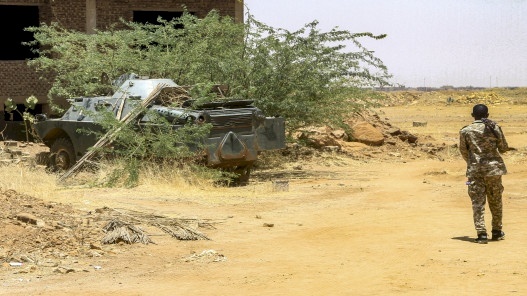
Sudan: New Opposition Coalition Threatens the Revitalized Peace Agreement
SadaNews - In a surprising development that reshuffles the cards in South Sudan, an unexpected alliance has been announced between Riek Machar - the First Vice President under house arrest - and the National Salvation Front movement led by General Thomas Cirillo, which rejects the peace agreement.
This rapprochement raises questions about the future of the fragile political settlement, and whether it signifies the beginning of the collapse of the peace process or merely a new pressure tactic on the government.
This alliance has been practically manifested through military coordination between the two sides, which included launching attacks on government army positions in the Equatoria region and around the capital Juba, a move that raised concerns about the stability of the existing peace agreement.
General Thomas Cirillo, leader of the National Salvation Front, stated in media comments last week that the military alliance with the Sudan People’s Liberation Movement/Army in opposition was a direct response to government attacks targeting opposition forces’ camps, which led to the displacement of their fighters from areas near Juba.
Cirillo added that the strategic goal of the alliance is to "save the country from the current regime and achieve just peace," calling at the same time for the immediate release of all political detainees - including Riek Machar - to create a suitable environment for any comprehensive national dialogue.
The joint military operation on August 16, 2025 marked the real beginning of the alliance between the Sudan People’s Liberation Movement/Army in opposition and the National Salvation Front rebels.
The operation targeted government forces' bases in Libogo and Lasu in Yei County in the southern region of the country, while the statement issued on this occasion warned civilians to stay away from military convoys on the equatorial roads for their safety.
According to analysts, the armed opposition led by the First Vice President Riek Machar resorted to this alliance after sensing the government's insincerity in releasing its detained leaders, which increased its frustration with the peace process.
This coincided with the government's dismissal of all its previous governors and parliamentary leaders in the national unity government, a step that the opposition viewed as a unilateral attempt to politically marginalize it.
In response to these measures, the opposition announced the formation of independent governmental structures in the Upper Nile and Equatorial regions, appointing governors and administrators in the areas under its control to enhance its influence and govern local affairs, aiming to affirm its capability to exercise authority as an alternative to the central government.
Observers believe that this alliance represents a new development in the political and security landscape, reflecting the ongoing disputes over the implementation of peace agreements and the release of detainees. They note that the establishment of parallel structures and the appointment of governors could affect the stability of the peace process and complicate national dialogue further.
Journalist Folino Akot states that the announcement of the alliance between the Sudan People’s Liberation Movement/Army in opposition led by Dr. Riek Machar and the National Salvation Front is a clear indication of the collapse of the revitalized agreement, especially after the government attacks on opposition forces' assembly sites.
Akot added in his comments to Al Jazeera Net, "I believe this alliance may evolve into a broader political coalition including the rest of the political forces abroad, in light of the Juba government's insistence on not respecting the terms of the agreement by detaining opposition leaders, led by Dr. Riek Machar. All indicators confirm that the revitalized agreement has ended, and the government in Juba bears full responsibility for that."
Reports indicate that the government has contributed to deepening the crisis by exploiting divisions within the armed opposition, supported by the current Minister of Peace, Stephen Far Kwol, who appointed himself as a temporary replacement for Dr. Riek Machar, and encouraged loyal leaders to return to positions that the opposition occupied in the federal government, national parliament, and state governments, in a move aimed at undermining the movement's influence and complicating the political scene.
Source: Al Jazeera

International Calls to De-escalate and Warnings of Serious Consequences After Strikes on I...

Syria: 4 Killed in Suwayda Due to Iranian Missile Strike

Moscow: The Attack on Iran is Dangerous and May Lead to Catastrophe

Closure of Airspace and Interception of Iranian Missiles in Gulf States

Lebanon Rejects Involvement in Regional Conflicts

Jordanian Army Announces the Downing of Two Ballistic Missiles Targeting the Kingdom

Two Explosions Rock Jalalabad in Eastern Afghanistan... Pakistan Denies Its Fighter Jet Cr...

